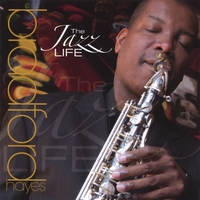Review by Brad Walseth
Some darn good playing to be found on this collection of songs both sweet and savory. For The Jazz Life, saxophonist Bradford Hayes assembled an exceptional ensemble of jazz musicians and recorded 5 of his original tunes, along with 6 others for his second release as band leader. A long time player and educator of some standing in the Newark, NJ area, Hayes spent 15 years with legendary African drummer Babatunde Olatunji - serving as his Musical Director during the last 3 years before the drummer passed away. Hayes has an interesting sound that is distinctly his own. He plays melodically and his tone is full, but a shade lighter than many - something that gives him a refreshing flavor to the ear.
Meanwhile, the band Hayes has put together really cooks. Bassist Calvin Jones and Greg Searvance on drums work extremely well together and push the group while keeping their heads in the beat. Trombonist Cornell McGhee adds some choice timbres. Pianist Michael Cochrane is fluid and his solos sparkle with humor and zest, while trumpeter Duane Eubanks deserves special mention for his sound and intelligence of his lines.
"Tunji's Blues" (written by Hayes for Olatunji) opens things off energetically with solos by all the members of the group. The groovy "Carolyn" - written for the saxman's wife - is rich and rewarding -one of the best tunes on the album, and Hayes' solo shimmers with love for his woman. Cochrane also shines on the keyboard here, and the rhythm section is tighter than O.J.'s glove. Wayne Shorter's "Black Nile" meanwhile finds Hayes and crew showing their respect to a major influence on the saxophonist's playing and composing. Eubanks shares the spotlight here and responds with a stellar Marsalis-inspired solo on trumpet.
The composer's "My Sons" is dedicated to Hayes' twin boys and his sax sings his love of family in his joyful solo over sprightly Latin rhythms provided by Jones and Searvance. And the band functions here as a harmonic family as again, Eubanks adds simmering trumpet, Cochrane's brilliant piano lines are a delight, and Jones' uber-rhythmic bass solo outstanding.
Perhaps the hottest number is "The Coaster" - a burner written by NJ native composer Grachan Moncur III. Hayes is on fire on his splendid solo over the driving rhythm section, Eubanks pitches in another melodic treat, McGhee's trombone is tasty, and Cochrane again proves a master of the keys. An utter delight of a tune and performed in an addictively zesty manner.
The mid-tempo swinging original "The Desert" is meant to present an image of the three wise men traveling across the desert, but there is an unmistakably urban feel to this landscape. Meanwhile, "Bianca's Dance" is another tune written for family - this time for Hayes' daughter. This song was the title track of Hayes' first release, but this time is presented as a samba - which suits this charming piece to a tee. This is perhaps the "hit" tune that radio programmers should be tuning into.
So wonderful to hear this version of "The Nearness of You" in which Hayes plays the straight melody. A song with such a strong and memorable melodic line like this is often cheapened by shows of technical virtuosity and tangents into uncalled for experimentation. Not so here, as Hayes and the band play it straight and unsentimental, and in doing so, help us rediscover the importance of melody and what a great melodic contour can do to the emotions of a listener.
Another standard - the great yet somewhat under appreciated Benny Golson's "Whisper Not" is given a most welcome and loving treatment. McGhee's trombone is velveteen and lyrical and Hayes' solo heartfelt and bluesy. Drummer Searvance supplies "One Little Indian" another up tempo piece with fine solos from all and some impressive tom-tom work by the medicine man on the skins.
"Holistic Invention" - written by Cochrane - touches on urban contemporary smoothness, without the pap element that mars so much of that idiom. The synthesizer solo is admittedly perhaps unnecessary, but Jones' electric bass solo is captivating.
The music on this album is unique in that it doesn't feature rappers or distorted electric guitars, but is simply back to basics goodness - back to the elements that seemingly made for the greatness of jazz - good arrangements, playing (solo or in ensemble), attitude - respect for the song, for friends and family (whether as parent or band leader), for life itself and music. Hayes' latest album is an intelligent and irresistible call for a return to "The Jazz Life" itself in all its greatness.
|

